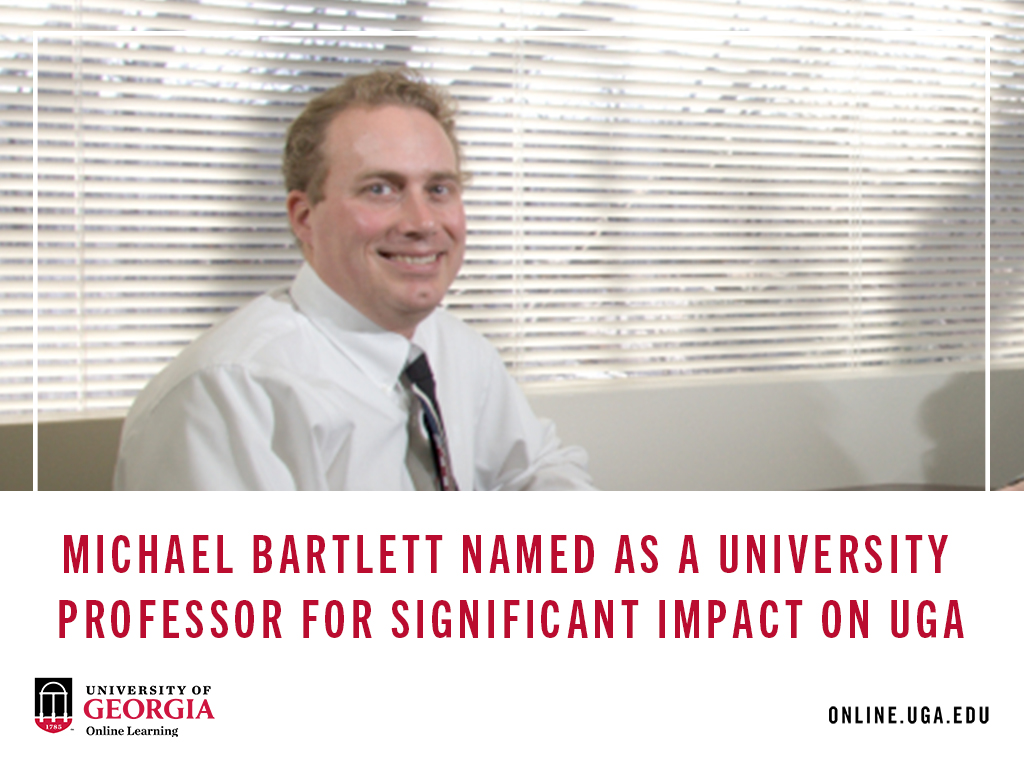Michael Bartlett named as a University Professor for significant impact on UGA
Michael Bartlett named as a University Professor for significant impact on UGA
Two distinguished University of Georgia faculty members, Michael Bartlett and Libby V. Morris have been named University Professors for significant impact, an honor bestowed on faculty who have had a significant impact on the university in addition to fulfilling their normal academic responsibilities.
Michael Bartlett is the associate dean for University of Georgia College of Pharmacy. and professor in the Online Masters in Pharmacy, International Biomedical Regulatory Sciences program.

Bartlett has championed innovative curriculum and programs in the College of Pharmacy while also significantly elevating its research activity. His institutional contributions include service on the President’s Faculty Advisory Committee, the Graduate Council, Core Facilities Advisory Team, and the Provost’s Task Force on Academic Excellence.
“I’ve worked hard to earn an international reputation for my work, looking for new and innovative bioanalytical methods to understand how molecules behave under a variety of conditions,” said Bartlett.
The creation of new academic programs to prepare students for success while meeting industry needs has been a major focus of Bartlett’s work. He led the effort to create the college’s first undergraduate program in 2014 and also oversaw the creation of two Double Dawgs linked bachelor’s/master’s degree programs. The most recent Double Dawgs program created the nation’s first biopharmaceutical engineering program by linking a bachelor’s degree in biochemical engineering with a master’s degree in pharmacy.
To strengthen ties with industry, he instituted the Pharmaceutical Sciences Advisory Board, which is composed of executives from regional and international pharmaceutical companies. He is the founding director of the Institute for International Biomedical Regulatory Sciences, which augments the state’s efforts to attract life science companies to Georgia. In addition to housing graduate and certificate programs, the institute hosts two annual conferences with the Food and Drug Administration that bring significant recognition to UGA.
As the college’s associate dean for science education, research and technology, he oversaw the college’s 2020 – 2025 strategic plan, facilities upgrades, and faculty recruitment efforts that have resulted in a significant increase in extramural funding. He is currently leading the college’s recruitment of faculty through the Presidential Interdisciplinary Faculty Hiring Initiative in Data Science and Artificial Intelligence and also supporting the creation of two new companies based on faculty research.
His discoveries have resulted in more than 180 peer-reviewed journal articles and book chapters and have been cited more than 4,500 times. He is the editor-in-chief of Biomedical Chromatography, a long-standing journal in his field. He is a collaborative scholar who has published at least one paper with 18 different faculty members in the college.
Bartlett’s honors include being named a Fellow of the SEC Academic Leadership Development Program and a Fellow of the American Association of Pharmaceutical Scientists. His teaching has been recognized with the Teacher of the Year Award bestowed by the college and the Teacher of the Year Award bestowed by students in the college.
Along with Michael Bartlett, Libby V. Morris is also recognized as a University professor for significant impact on UGA. Libby V. Morris the Zell B. Miller Distinguished Professor of Higher Education and director of the Louise McBee Institute of Higher Education.
“Dr. Bartlett and Dr. Morris are deeply committed to their students, their scholarship and, more broadly, elevating the University of Georgia as a whole,” said S. Jack Hu, senior vice president for academic affairs and provost. “They exemplify the unwavering dedication that makes our institution a leader in public higher education.”
Read the original article here.
